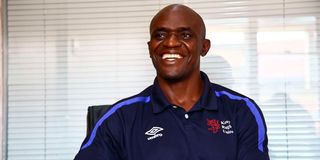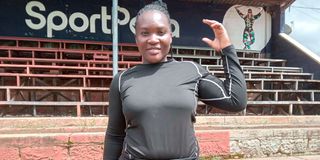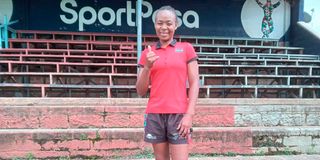Not just a coach: Dennis Mwanja is rewriting the rules for women in rugby

Kenya Lioness Coach Dennis Mwanja during an interview at Nation Centre, Nairobi, on March 20, 2025.
What you need to know:
- Former rugby star Dennis Mwanja transforms Kenya Lionesses, navigating criticism and redefining women’s rugby coaching.
- From Ironman to Lionesses coach, he embraces challenges and drives change in women’s rugby.
Former rugby international Dennis Mwanja never imagined he would coach a women’s team. It never even crossed his mind. He was introduced to rugby by Bill Odongo at Musingu High School in Kakamega.
Known in his playing days as “Ironman,” Dennis made his name as a hard-hitting, fearless competitor for Kenya Sevens team (Shujaa) and Kenya 15s team (Simbas). Raised in Lang’ata, Nairobi, since he was one-year-old after being born in Kapenguria, West Pokot County, Dennis built a reputation as a workhorse, the kind of forward who would grind through tackles and never back down from a physical challenge.
After retiring in 2014, he imagined his next chapter would be defined by guiding young men—perhaps one day leading the Shujaa himself. He coached Thika RFC and KCB RFC, honing his craft and waiting for his shot with a men’s national side. But fate, as it so often does, had other plans.
“I always thought I’d coach a men’s team,” Dennis admits, reflecting on the twists of his journey. “I [unsuccessfully] applied for the Shujaa coaching job more than once. But in 2022, I was invited to temporarily assist with Kenya’s Lionesses because the head coach, Felix ‘Ade’ Oloo, had personal commitments and he requested me to step in as his assistant. Just on a temporary basis, I thought. A month later, the head coach left after he got greener pastures, so I ended up stepping up from the assistant position role to the head coach.”
The appointment was unexpected, both for him and the rugby community. Dennis was now tasked with leading a women’s national team in a sport where female players often operate in the shadows of their male counterparts. It wasn’t smooth sailing from the start.
“I was excited because it was a new adventure. But I’ll be honest, I didn’t know how to handle women,” he confesses. “I came from coaching men at KCB. I was used to a more aggressive approach. At first, I was too soft and delicate. I realised when I was doing that, the girls were not taking it so seriously.
"Some of the players came to me and said, ‘Coach, you need to be firm with us. The girls are looking at you as if you are scared of them, like you are shy, you are not shouting.’ That really hit me. I had to be firm, to be loud, to be commanding. I would say that's the language they understand.”
Once he adjusted, things began to shift. The players responded positively, and trust started to grow. Still, outside the pitch, scepticism remained. That scepticism exploded on his first international assignment with the girls. After an early 10-5 loss to Uganda in the 2022 African Women’s Sevens in Tunisia, criticisms came thick and fast. On social media and within rugby circles, many questioned his appointment. “People said I had no experience with women’s teams. Some even claimed I was wasting my time.”
It was the first time Uganda Lady Cranes defeated Lionesses in rugby sevens. “There were those who believed men shouldn't coach women at all. It was tough because there were discriminatory remarks like “why would a man coach a women's team?”
It was also the time Lionesses were rebuilding from the 2020 Olympics. “There were only a few experienced players, including Grace Okulu, Christabel Lindo and Stella Wafula. We brought in Janet Okelo, who had just got a professional contract in Japan. So the team had not gelled. I saw on Facebook someone who I know was writing that I didn't have the experience to handle women's teams and they needed someone who had worked with women.
“I even heard someone from a club nearby say they should bring someone who had worked with women before. That it doesn't make sense to bring someone who has worked with men to come and handle the women and that's why they are losing.
"Plus, many other messages I got from my inbox, like you are wasting your time working with women. Even one of my former teammates in Kenya's Sevens inboxed me and told me he respects me as a friend, ‘but coaching women, they are disorganised and it's a useless thing.’”
Support
Amid the backlash, his family, especially his brother, Michael, offered steadfast support.
“Michael worked at the Kenya Rugby Union Secretariat and played rugby, so he understands. He is always there. He comes to our training sessions and gives me honest feedback.
"Normally, he points out about the girls, their improvements, even their weaknesses, and is honest about where their shortcomings are, and just individually and character-wise the things he observes. So it's a good encouragement.”
Dennis’s role as head coach opened his eyes to the systemic inequalities that plague women’s sports—not just in rugby, but across the board. “I’ve come to realise how unsupported women’s sports are,” he says.
“And it’s not just about men failing to support them. Even within the broader community, including women, there’s a lack of buy-in. Before M-Pesa came on board in November 2024 as a sponsor, we were really struggling.”
Dennis notes that even the country’s male premier clubs—KCB, Menengai Oilers, Kabras Sugar—have been slow to prioritise women’s teams. “If these clubs invested seriously in women’s rugby, the entire ecosystem would benefit. Right now, it feels like we’re patching things together.”
The challenges for Lionesses extend beyond funding and recognition. Cultural perceptions, logistical obstacles, and motherhood all shape the reality of playing rugby as a woman. “Most players are from Luhya, Luo, or Kisii backgrounds. But we find people from Central, Coast, Eastern playing, but the majority are from the three mentioned main areas. We had one player [Ann Namnyak] from the Maasai community, but she left.”
Motherhood presents another layer of complexity. “We don’t have systems that support players who are mothers,” he admits. “We do not allow them to come with their babies to camp. Of course, they have relatives, so they should find a way to keep their children there. There is one who just got back from maternity leave two years ago. She could have come earlier, but she did not have a nanny or house help. So we told her to sort out herself and come when she's ready.”
Dennis says when mothers are ready to come back to the team, they are let in. “But if they're not ready to come back, too bad. Because this is a training environment and not a nursery. So people should be serious enough to plan their lives. But if they cannot plan, we cannot plan for them. We will not pick them.”
He says pregnancy comes with a lot of issues that are medical, humanitarian and to avoid all that, “if you have a baby, don't come. And if you cannot come, then it's the end. Then let's just continue getting young girls. So it forces them to be mature and responsible enough to know if someone has gone the family way, to plan their lives and get back. But if they are not able to return, it’s not our business to manage people's lives.”
Dennis says access to menstrual products is an individual arrangement.
“Those are things every decent woman must know. Even in your workplace, it's the same thing. But now for sports, they have to manage themselves. By the time someone gets to over 18 years, they must know how to manage their bodies. It is not my business as a coach to even bother with those things.
"But if they have those issues and can't show up for training, then I swiftly remove them and get to the next player. Because internationally, there are women who play and train. So they cannot say that it's that time of the month. They have to just sort themselves out. They are mature enough.”
One of Dennis’s biggest revelations has been the difference in coaching men versus women. “Men are more results-oriented. They thrive on performance metrics. Women are relational. They need to feel safe, emotionally and mentally, before they give you their best.”
He adds, “With men, you can bark orders and they’ll get on with it. Women often wait for instructions. They want clarity and explanation. It forced me to rethink my coaching style. I’ve grown a lot.”
But the rewards are unmatched. “These women are warriors. Many come from incredibly tough backgrounds. When I see them succeed, represent Kenya, get jobs in the police or military—it’s deeply fulfilling.”
He wants more than short-term victories. “We’re building a pipeline. It’s not just about winning now—it’s about creating future coaches, administrators, and advocates.”
Few stories embody that mission like Mitchelle Atieno’s. Born in Nairobi in 2004, Mitchelle started playing rugby in Grade 6 at Drive-Inn Primary School in Ruaraka. Her passion deepened in high school, under the mentorship of former Lioness player Philadelphia Olando at St Teresa’s Girls. But her promising rise paused when she became a mother at 18. “After maternity leave, Coach Mwanja believed in me,” she recalls. “He saw my potential and called me back. That moment reignited everything I’d dreamed about as a girl.”

Kenya Lionesses player Mitchelle Atieno during a training session in RFUEA Grounds, Nairobi, on May 15, 2025.
Mitchelle is candid about the gender dynamics in sport. “For personal issues—periods and pregnancy— there is also protocol. If you're not feeling close to one coach, there is an assistant coach, and there is the team, and the captain you'd speak to, or another player, so there are safe channels for your issues, too. Personally, I speak with our female team managers Camilyne Oyuayo and Peruz Muyuka. I was raised by a mother, so I’m more comfortable confiding in women.”
Still, she appreciates the professional boundaries and respect Dennis maintains. “He gives us space when we need it. But he also pushes us when we’re ready.”
Motherhood
Motherhood, Mitchelle says, requires military-like planning. “Rugby training sessions start early. It’s cold at that time. You can’t bring your baby to training. Training is usually half a day, so you make sure the baby has milk, then when you go back, you breastfeed. So, that is something you are being taught during pregnancy. So, by the time you want to come back as a player, you have already decided on your plan.”
Financially, life is far from stable. “Sometimes payments are delayed. You do what you can to survive. I studied hospitality at Boma International College. I’m a certified barista. I know rugby won’t last forever. I’m building a life beyond the pitch.”
Her mother is her anchor. “She takes my son to daycare, helps when I travel. I couldn’t chase this dream without her.”
Mitchelle plays for Northern Suburbs RFC, juggles national team duties, and raises a child—all while advocating better support. “We need mentorship, open conversations about balancing life and sport, and more consistent policies. Pads, maternity leave—these things matter.”
Linet Moraa, affectionately known as “Rudisha” for her speed, is another pillar in Lionesses setup. Born in 1996, she’s seen the game evolve from the fringes to the international stage, having represented Kenya at the 2016 Olympics in Rio de Janeiro, Brazil.

Kenya Lionesses player Linet Moraa “Rudisha” during the interview in RFUEA Grounds, Nairobi, on May 15, 2025.
Now a mother of two, her perspective carries the weight of experience. “Coach Mwanja listens. He’s patient. If I don’t understand something, I know I can ask. That kind of relationship makes a difference.”
Returning after childbirth, she says, requires grit. “You start from zero. You have to prove yourself all over again.”
Her mornings are meticulously scheduled. “My children are six and one and a half. I wake up early, prepare meals, arrange childcare, then head to training.”
She’s open about menstrual challenges. “You don’t miss training—you just let the coach know you’re not at 100 per cent. He understands and we adjust. But the key is honesty.”
Outside rugby, Linet sells tomatoes to make ends meet. “Rugby alone can’t pay the bills. You hustle.”
Her message to aspiring players is simple: “No shortcuts. Hard work is the secret.”
For Dennis, stories like Mitchelle’s and Linet’s are daily reminders of what’s at stake. The promise is undeniable, but the systems are lacking. “The HSBC Challenger showed we’re moving in the right direction. But the local league? It’s a mess. Walkovers. No structure. We need investment, consistency, and vision. We must prepare these women for life—not just the next tournament.”
On his watch, the Kenya Lionesses are not only chasing medals; they’re challenging norms, confronting inequality, and redefining what it means to be an athlete, a mother, and a leader. They are building a legacy that transcends the sport—one training session, one match and one child at a time. And in guiding them, the once “Ironman” of Kenyan rugby has discovered a new kind of strength—one forged not in scrums and tackles, but in empathy, resilience, and the quiet revolution of women who refuse to be sidelined.
Lionesses made a strong statement in the just-concluded 2025 World Rugby Challenger Series season where they emerged champions in April after finishing the three legs of the second-tier tournament (Cape Town I, Cape Town II and Krakow) on top of the standings with 58 points, two ahead of arch-rivals South Africa.
By virtue of finishing the Challenger Series in the top-four bracket, the side qualified for the eight-team playoffs competition against bottom-four from the World Rugby Sevens Series held in Los Angeles, USA, on May 3–5. Lionesses lost 33-14 to Spain and 28-10 to Brazil before they regrouped to defeat Colombia 7-5 in Pool “A” matches to qualify for one of the two playoff finals.
Lionesses mauled South Africa 17-14 in their playoff final after coming from behind twice to clinch the ticket to the newly-formed HSBC Division 2 in 2026. Before 2025, Lionesses had never won a leg in the Challenger Series since it was started in 2020.

